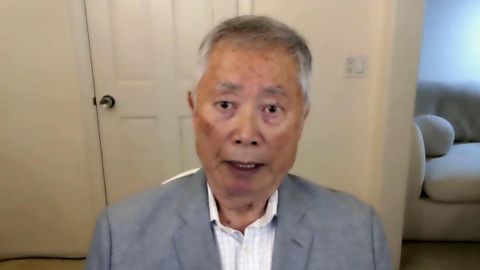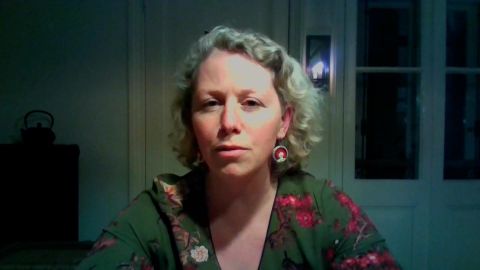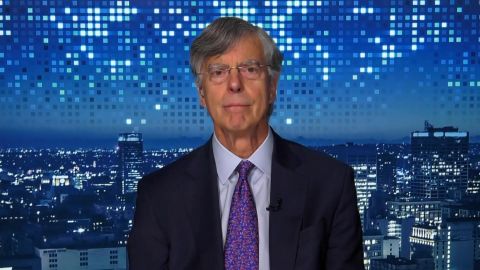Read Transcript EXPAND
CHRISTIANE AMANPOUR: Now, more of our look now into the hateful surge of anti-Asian racism with our next guest. Actor, George Takei, became a sci-fi legend when he starred as Mr. Zulu in “Star Trek.” But his road to success was not sure thing in the America he grew up in. As a young Japanese American boy during World War II, he was sent to the famous internment camps along with his family. Here he is now talking to our Hari Sreenivasan about the history behind today’s anti-Asian attacks.
(BEGIN VIDEO CLIP)
HARI SREENIVASAN: Christiane, thanks. George Takei, thanks for joining us.
GEORGE TAKEI, ACTOR AND ACTIVIST: Pleasure.
SREENIVASAN: As you look over the past couple of weeks and really months now, what’s been going through your head?
TAKEI: Well, it’s more than just going through my head. It is chilling. In fact, I would go even further there. It’s a frigid wave that gone lieu the Asian-American community. I mean, I may not have been attacked, but we have parents and grandparents and brothers and sisters, nieces and nephews, and we worry for them. I have a grandniece who just entered Brown University and I am terrified what might happen to her. So, it is really a horrible situation that we have right now. Every moment, we are concerned.
SREENIVASAN: Now, what is interesting is you are one of the few people who are still alive who went through the internment camp that the Japanese were put into. But when you talk to people like your —
TAKEI: Japanese Americans.
SREENIVASAN: Japanese Americans. Sorry.
TAKEI: We are not the enemy. I mean, we looked like the enemy. And that’s why I chose the title of my newest graphic memoir, “They Called Us Enemy”. They being the United States. And not only the people of the United States, but the government of the United States saw us as the enemy. My siblings and I were born here in Los Angeles. My mother was born in Sacramento, California. My father was born in japan. But he was brought to San Francisco as a boy. And he was reared, educated, went to college in San Francisco. We were a Japanese-American family rounded up by the United States government and put into made to United States concentration camps, barbed wire fence, sentry towers, machine guns pointed at us. And that — it was not a Japanese prison camp. It was an American one. We were in the swamps of Arkansas. So, please get that term right. I have always resented the term Japanese concentration camp or Japanese internment camps. They were American internment camps guarded over by the United States army and guarding — imprisoning American citizens who had nothing to do with Pearl Harbor other than looking like the people that bombed Pearl Harbor. But when Pearl Harbor happened, that terror swept up this country. We were all terrorized. And the country was swept up war hysteria with a toxic element of racism. And the president was stampeded by that kind of hysteria and signed Executive Order 9066, which ordered all Japanese-Americans on the West Coast, approximately 120,000 of us, which includes me and my family. And I will never be able to forget that morning when my father rushed into our bedroom, woke us up. I was the oldest brother. A year younger, Henry, was in that bedroom. He dressed us hurriedly. And we’re told to wait in the living room while our parents did some packing back this the bedroom. And so, the two of us were gazing out the front window. We saw two soldiers marching up our driveway carrying a rifle with shiny bayonets on them. They stomped at the front porch and with their fists, began pounding on the door. We were terrorized. That is the history of America as I know it. And that is part of my personal history.
SREENIVASAN: I apologize for misspeaking, sincerely. I asked the question partly because do you think that this wave is happening in part because we are not connected to that history nearly as much as we should be?
TAKEI: I agree whole heartedly. The hate of Asians and Asian-Americans is as old as American history from the time that the Asians started immigrating to this country, which started about in the 1840s with the first wave of Chinese laborers coming to the United States. And the discrimination began from that point. Immigrants coming from anywhere in the world could someday aspire to become naturalized American citizens with the single exception of immigrants coming from Asia. Simply because they were coming from Asia, they were denied naturalized citizenship. In my hometown of Los Angeles, as early as in the 1870s, 1871, I think, when a white woman claimed that she was assaulted by a Chinese unanimous and a vigilante mob quickly (INAUDIBLE), gored into Chinatown, dragged out 17 Chinese men onto the central plaza of our pueblo at the time. And there is a great big tree at the center the plaza. They were strung up, lynched. Literally lynched in the heart of Los Angeles from a huge tree. And that tree still exists. It’s a gigantic tree today. But in 1871, 17 Chinese men were lynched in our town square.
SREENIVASAN: You know, in a way, there are a couple of different veins where Asian-Americans kind of just — or umbrellas that Asian-Americans get captured into. On the one hand, we are invisible. On the other hand, there’s a sort of notion of the model minority that we’re incredibly, you know, crazy rich Asians successful, right? And both of those are kind of different traps that seem to lead to this.
TAKEI: Well, the term model American encompasses more than just that. We are studious. We are hard working. We are bright. We are good at mathematics. And we succeed. But we don’t call attention to ourselves. We don’t speak out. We’re silent. For example, my parents’ generation, who suffered the most, they endured the pain and the anguish of lost and humiliation and literally, you know, innocent people being imprisoned. They — my parents were the ones that went through the worst of it. That generation didn’t talk about it with their children because they felt they didn’t want to inflict their children with the pain that they felt, which is an understandable parental concern. But I feel it was wrong. My parents did not feel that way. They talked to me. When I became, in my preteens, curious about our imprisonment, my father explained the me in the appropriate language. And as I grew older, he introduces to me the idea of American democracy, being a people’s democracy, it is a participatory democracy and it is important for to us actively engage in the political process. And when I was still a teenager, my father took me downtown to the Adlai Stevenson for President Campaign headquarters and introduced me to electoral politics. And I am a gregarious type. I enjoyed that, but I was learning things at the same time. I got my father’s message. We have to participate. But most Asian-Americans didn’t have the kind of parent that I had. And so, they were inculcated with the idea of holding it all in, enduring the pain and surviving. And that’s where that model minority concept came from.
SREENIVASAN: When you go back, I mean, there have been these incredibly horrible moments. I am still old enough to know about, you know, Vincent Shannon (ph), what happened in Detroit when these two people beat him to death and didn’t go to jail for it. And — but at the time, I didn’t see a response like I am seeing now to the flurry of videos that are being shared, the stories that are being talked about. I mean, is that a process of the fact — is that a function of the fact that we have, you know, technology and media that will communicates these things faster? Is there something that’s changing in our mindset?
TAKEI: Well, in those days, in the 1980s, we didn’t have the phone, the cell phone. And so, you couldn’t send out Instagram pieces. But what happened the Vincent Chin, and he was a China-American. But at that time, the impact of Japanese automobiles on the American automobile market was producing a lot of layoffs in Detroit. And that was the anguish of the unemployed auto workers. And there happened to be a father and son combo if that bar. And Vincent Chin was celebrating his bachelor party. Chinese-American. These guys were festering over Japan automobiles. He looked Asian — I mean, he looked Japanese to them. We are all the same. We look alike to them. And an argument broke out in that bar. Vincent Chin left. They followed with a baseball bat and beat him to death. So, it was — but that galvanized the Asian-American community from the West Coast to the East Coast. I was living in Los Angeles at the time. When the murderers were brought into court, the judge said he understood the pain of unemployed auto workers. He was there talking about these murderers, but he understood their pain as unemployed auto workers and he gave them a slap on the hand, a fine, $3,000, and probation. It was outrageous. And then they disappeared. So, you know, they were getting away scot-free with a brutal, outrageous, racist murder. And I flew from L.A. to Detroit to speak at the rally there. But it galvanized the Asian-American community. This was a whole different generation. We were not quiet. Throughout the nation, people came from New York, from Chicago, Los Angeles, San Francisco, Seattle, and we created a national surge of the Asian community opposing this kind of outrage.
SREENIVASAN: Do you think that this momentum right now is sustainable, that there can be any kind of a national infrastructure, a ground swell of young Asian people, for example, running for political office, whether it is the city council or higher?
TAKEI: I know American history. Whenever there is an incident, a major incident, there is this swelling up, a surge of Asian hate. And then the hate continues on in a slow simmer. I mean, things happen to the Asian- American community, but it’s quiet. But now, this generation, not my generation, but generation after me is galvanized and they will be active. And even when the issue sort of calms down, they — hate crimes are happening. And the problem is, they will not recognize outrageous brutality against Asian-Americans as a hate crime because a word wasn’t used. An epithet wasn’t used, go back to China, go back to Vietnam, terms that identifies racism. The sheriff in Georgia is claiming it’s not a hate crime because this guy had a sexual addiction. It is hypocrisy and incredible naivety to not recognize that in the American mind, women, Asian women and sex are the same. The problem, it’s systemic racism that personified sex with Asian women, because we have a history of that. In fact, we celebrate that, you know, in movies and Broadway musicals, the titled, “The World of Suzie Wong” or “Miss Saigon” is very familiar to us. They were very popular shows. It was Asian prostitutes that were celebrated in those musicals. And they were inspired by a 19th century story called “Madam Butterfly” which eventually became an opera. I mean, it’s become the image that America has of Asian women because of movies, stage plays and all the other, you know, constant television series that portray Asian or Asian- American women as prostitutes. We have that history. It is systemic racism to say that a sex crime is not racist.
SREENIVASAN: George, I have got to ask. I mean, you have been engaged in the politics of America, in the conversations about civil rights for decades now. There you were as a child, perceived as the enemy, regardless of the fact that you were born in the United States. Here we are —
TAKEI: As was my mother.
SREENIVASAN: Here we are decades later and there are still Asian-Americans second, third, fourth generation, who are born in the United States who still are perpetually a foreigner.
TAKEI: Well, it’s stopping now. We are electing one of us into very visible, vocal public servants. I saw Grace Meng — Congresswoman Grace Meng on TV recently. And we have in the Senate — U.S. senate, a senator from Hawaii, Mazie Hirono, very vocal woman on the Judiciary Committee. We have half a dozen Asian-American Congress people. We are in state government. We are now becoming part of America, speaking out in chorus with the enlightened activist Americans throughout the country and we are making America. You know, I did “Star Trek.” And one of the mottos of the starship enterprise, which in itself was a metaphor for starship earth, the strength in the starship lays in it is diversity coming together and working in concert as a team tapping the unique assets of each of those members of that diversity. And so, we are becoming, at long last, a real part of the American democracy.
SREENIVASAN: George Takei, thanks so much for joining us.
TAKEI: Thank you very much.
About This Episode EXPAND
Bill Taylor; Christine Runyan; George Takei; Sanne Derks
LEARN MORE



